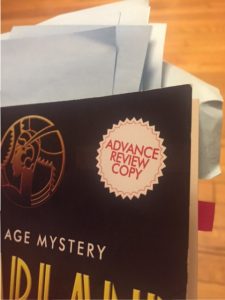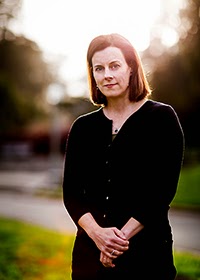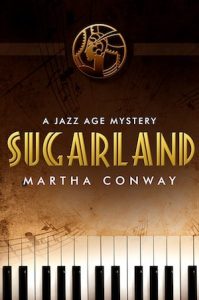How to Write about Something You Know Nothing About
 I recently began taking piano lessons as an adult, and I can now tell you this for certain: I am no musician. On the first day, when I told my piano teacher that I wanted to learn to play ragtime, she said: “Why does everyone always want to tackle the hardest music first?”
I recently began taking piano lessons as an adult, and I can now tell you this for certain: I am no musician. On the first day, when I told my piano teacher that I wanted to learn to play ragtime, she said: “Why does everyone always want to tackle the hardest music first?”
I didn’t tell her that what I really wanted to play was the early jazz that came out of ragtime, which seemed even harder. Jazz, and the 1920s culture that surrounded it, is something I’ve wanted to write about for a long time. As a happy listener, I’ve always responded to the emotions that early jazz evoked in me. As a novelist, I thought it would be easy enough to “make things up.”
However, to write about music requires a precise musical vocabulary, which I did not have. So I did what I always do when setting out to write a new novel: research.
This time, however, the research wasn’t all about what kind of food people ate back then and what the current headlines were about. This time the research itself was in a foreign language: “A chorus may be split neatly in half, the first part leading to the dominant, the second ending on the tonic.” I recognized some nouns there, like chorus, while others—dominant, second ending, tonic—clearly had meanings beyond a two-time divorcee or a kind of fizzy drink.
Jazz music, probably all music, is so rich and so complex it would have taken me decades to decipher all the technical complexities, and I didn’t have decades. Clearly I needed to enlarge my research process. Here are some of the things I did, and would recommend to other writers:
- Ask someone knowledgeable in the field for advice
One of my daughter’s teachers was a musician, and I told him about my problem. He loaned me probably the single most important book I read: “What to Listen for in Jazz” by Barry Kernfeld. It came with a music cd with historic jazz recordings, which meant I could listen to a song while simultaneously reading the analysis in the book—in musical jargon that I could copy, like a monkey. I also found online musical dictionaries for words like “flutter tongue,” and went to you-tube for demonstrations of a tremolo. Little by little, although I didn’t understand everything, I could match some of the vocabulary to a sound. Or make it seem as if I did.
- Read first-hand accounts
 I found interviews with some of these early musicians; American Musicians: 56 Portraits in Jazz by Whitney Balliett, for example. These were extremely helpful, because in the course of the interview, Mary Lou Williams might explain something she did with her music, but in lay terms, for the journalist. I also read memoirs, such as Treat it Gentle by the great Sidney Bechet, where he talked about the very earliest musicians who played before sound recording, like Buddy Bolden. His descriptions were perfect for an amateur like me, and I could relate to them: “That music, it wasn’t spirituals or blues or ragtime, but everything at once, each one putting something over on each other.”
I found interviews with some of these early musicians; American Musicians: 56 Portraits in Jazz by Whitney Balliett, for example. These were extremely helpful, because in the course of the interview, Mary Lou Williams might explain something she did with her music, but in lay terms, for the journalist. I also read memoirs, such as Treat it Gentle by the great Sidney Bechet, where he talked about the very earliest musicians who played before sound recording, like Buddy Bolden. His descriptions were perfect for an amateur like me, and I could relate to them: “That music, it wasn’t spirituals or blues or ragtime, but everything at once, each one putting something over on each other.”
- Have a professional read through your manuscript before it goes to print
One of the very last things I did was to ask my piano teacher if she would read through the ARC (Advance Review Copy) of my manuscript. She found and, most importantly, corrected quite a number of errors. Some of what she found was vocabulary that “we wouldn’t use now.” Usually that was from some first-hand account, and I didn’t always change it. Language changes just as music changes, and I wanted to portray, as well as I could, this early vernacular.
 There was a myth in the jazz world that early jazz musicians could not read notes. This is more prejudicial than fact—a way to discredit the real technical skill that jazz musicians, who were usually African-American, possessed.
There was a myth in the jazz world that early jazz musicians could not read notes. This is more prejudicial than fact—a way to discredit the real technical skill that jazz musicians, who were usually African-American, possessed.
However, as savvy performers, some early musicians played to that myth for white audiences. They knew very well how to read a score, but they played without one. I felt sometimes that writing SUGARLAND I was a mirror to that myth. I didn’t have the technical skill, but I faked it. I improvised, just like a real musician.
—
Martha Conway is the author of Sugarland: A Jazz Age Mystery [Noontime Books], available via Amazon.
Conway’s first novel was nominated for an Edgar Award, and her second novel, Thieving Forest, won the 2014 North American Book Award for Best Historical Fiction.
Her short fiction has been published in The Iowa Review, The Carolina Quarterly Review, The Quarterly, The Massachusetts Review, Folio, and other journals. She teaches creative writing for Stanford University’s Continuing Studies Program and UC Berkeley Extension, and is a recipient of a California Arts Council Fellowship for Creative Writing. Born in Cleveland, Ohio, she is one of seven sisters. She currently lives in San Francisco.
Find out more about her on her website: http://marthaconway.com/
Follow her on twitter @marthamconway
Category: Contemporary Women Writers, How To and Tips























